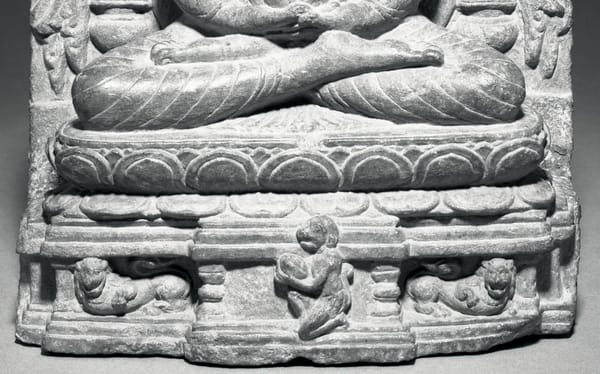pursuing gain with gain
Katamo ca, bhikkhave, micchāājīvo? Kuhanā, lapanā, nemittikatā, nippesikatā, lābhena lābhaṃ nijigīsanatā—ayaṃ, bhikkhave, micchāājīvo.
And what, bhikkhus, is wrong livelihood? Scheming, talking, hinting, belittling, pursuing gain with gain: this is wrong livelihood.
MN 117: The Great Forty (English) - Majjhima Nikāya - SuttaCentral
Therein what is “seeking gain with gain”? One who depends on gain, honour and fame, who has bad wishes, who is troubled by wishes, takes there material things received here; brings here material things received there; that which is similar, wishing, seeking, continuous seeking, act of wishing, act of seeking, act of continuous seeking for material things. This is called seeking gain with gain.
Vb 17: Analysis Of Small Items (English) - Vibhaṅga - SuttaCentral
The Cullavagga, in a section that begins with the same origin story as the one for this rule (Cv.I.13-16), treats the banishment transaction in full detail, saying that a Community of bhikkhus, if it sees fit, has the authority to perform a banishment transaction against a bhikkhu with any of the following qualities:
9. He practices wrong modes of livelihood.
This last category includes such practices as:
b) scheming, talking, hinting, belittling others for the sake of material gain, pursuing gain with gain (giving items of small value in hopes of receiving items of larger value in return, making investments in hopes of profit, offering material incentives to those who make donations). (For a full discussion of these practices, see Visuddhimagga I.61-82.)
The Buddhist Monastic Code I, pg 153-4 | trans. Thanissaro Bhikkhu | PDF
65: ”Herein, what is pursuing gain with gain? Seeking, seeking for, seeking out, going in search of, searching for, searching out material goods by means of material goods, such as carrying there goods that have been got from here, or carrying here goods that have been got from there, by one bent on gain, honour and renown, by one of evilwishes, a prey to wishes—this is called pursuing gain with gain.”19 (Vibh 352–53)
82:`In the description of pursuing gain with gain: pursuing is hunting after. Got from here is got from this house. There is into that house. Seeking is wanting. Seeking for is hunting after. Seeking out is hunting after again and again. The story of the bhikkhu who went round giving away the alms he had got at first to children of families here and there and in the end got milk and gruel should be told here. Searching, etc., are synonyms for “seeking,” etc., and so the construction here should be understood thus: going in search of is seeking; searching for is seeking for; searching out is seeking out.
Path of Purification (Visuddhimagga) | trans. Bhikkhu Nanamoli | PDF
MN 117 defines wrong livelihood as dissembling, talking, hinting, belittling, and pursuing gain with gain. The Visuddhimagga’s long discussion of these terms (I.60-82) may be summarized as follows:
pursuing gain with gain means making a small gift in hopes of getting a large gift in return (this would include making investments in hopes of profit, and offering material incentives to those who make donations).
To prevent a bhikkhu from pursuing gain with gain—and from displeasing his donors—there is a rule that a bhikkhu living off the gifts of the faithful should not take those gifts and give them to lay people. To do so is called bringing a gift of faith (saddha-deyya) to waste. The one exception is that one may always give those gifts to one’s mother or father. The Commentary notes that this allowance holds even if one’s
parents are royalty. However, it does not extend to other relatives.
None of the texts define which gains do and do not constitute gifts of faith, but the term itself suggests that it would not apply to gains accruing to a bhikkhu for reasons other than the faith of the donor, such as an inheritance from his parents or funds derived from work done before his ordination.
The Buddhist Monastic Code II, pg 120- | trans. Thanissaro Bhikkhu | PDF



